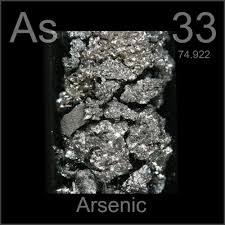arsenic
英 [ˈɑː.sən.ɪk]
美 [ˈɑːr.sən.ɪk]
- n. 砷;砒霜;三氧化二砷
- adj. 砷的;含砷的
星级词汇:

记忆方法
将“arsenic”想象为一个“arse”后跟一个“tic”,就像某人(arse)在后面加上一个“tick”标记,寓意这是不寻常的、危险的物质,因为“arsenic”是一种有毒的元素。这样的联想可以帮助记忆这个单词的含义。
以上内容由AI生成, 仅供参考和借鉴
中文词源
arsenic 砷,砒霜
词源略。可能受词根ard的影响,因砷可燃。
英语词源
- arsenic
-
arsenic: [14] The term arsenic was originally applied to the lemon-yellow mineral arsenic trisulphide, and its history reveals the reason: for its appears to be based ultimately on Persian zar ‘gold’ (related forms include Sanskrit hari ‘yellowish’, Greek khlōros ‘greenish-yellow’, and English yellow itself). The derivative zarnīk was borrowed into Arabic as zernīkh, which, as usual with Arabic words, was perceived by foreign listeners as constituting an indivisible unit with its definite article al ‘the’ – hence azzernīkh, literally ‘the arsenic trisulphide’.
This was borrowed into Greek, where the substance’s supposed beneficial effects on virility led, through association with Greek árrēn ‘male, virile’, to the new forms arrenikón and arsenikón, source of Latin arsenicum and, through Old French, of English arsenic. The original English application was still to arsenic trisulphide (orpiment was its other current name), and it is not until the early 17th century that we find the term used for white arsenic or arsenic trioxide.
The element arsenic itself was isolated and so named at the start of the 19th century.
=> chlorine, yellow - arsenic (n.)
- late 14c., from Old French arsenic, from Latin arsenicum, from late Greek arsenikon "arsenic" (Dioscorides; Aristotle has it as sandarake), adapted from Syriac (al) zarniqa "arsenic," from Middle Persian zarnik "gold-colored" (arsenic trisulphide has a lemon-yellow color), from Old Iranian *zarna- "golden," from PIE root *ghel- (2) "to shine," with derivatives referring to bright materials and gold (see glass).
The form of the Greek word is folk etymology, literally "masculine," from arsen "male, strong, virile" (compare arseno-koites "lying with men" in New Testament) supposedly in reference to the powerful properties of the substance. The mineral (as opposed to the element) is properly orpiment, from Latin auri pigmentum, so called because it was used to make golden dyes.
权威例句
- 1. His wife poisoned him with arsenic.
- 他的妻子用砒霜把他毒死了.
- 2. Arsenic is a poison.
- 砒霜是毒药.
- 3. Strychnine, arsenic, and opium are poison.
- 马钱子碱 、 砷和鸦片都是毒药.
- 4. The analysis showed a few grains of arsenic in the solution.
- 分析显示溶液中有几格令的砷.
- 5. Arsenic is widely associated with the manufature of herbicides and pesticides.
- 砷广泛地应用于除草剂和杀虫剂的制造中.
